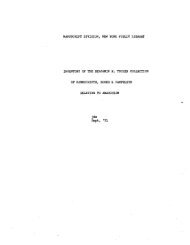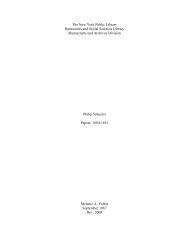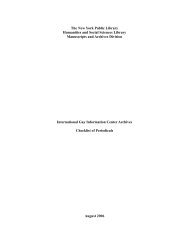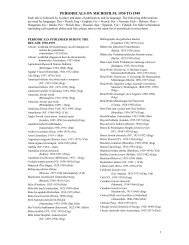- Page 1 and 2:
...\* t 4 0-4. 14;51L- 4,sts,- * c4
- Page 4 and 5:
ovs.4 LAO c ST. f.rx to, r POST 0.
- Page 7 and 8:
Previous pages: The Great Synagogue
- Page 9 and 10:
11. o. o , _J Jr- ,a0 _ A -;-.
- Page 11 and 12:
Foreword to the English Translation
- Page 13 and 14:
FIGHTERS ON THE FRONT AND IN THE FO
- Page 15 and 16:
FOREWORD TO THE ENGLISH TRANSLATION
- Page 17:
ACKNOWLEDGMENTS TO THE ORIGINAL YIZ
- Page 21 and 22:
HISTORY OF THE JEWISH COMMUNITY IN
- Page 23 and 24:
HISTORY OF THE JEWISH COMMUNITY IN
- Page 25 and 26:
THE EARLY DAYS THE HISTORY OF LUBOM
- Page 27 and 28:
egion, robbing, plundering, and mur
- Page 29 and 30:
More striking is the comparison wit
- Page 31 and 32:
il'7t*/ l'53'Iti,1 1,1" 3, trnn,,$3
- Page 33 and 34:
for other local revenue. In 1611, a
- Page 35 and 36:
history was connected with the regi
- Page 37 and 38:
(May 5, 1626), he set the following
- Page 39 and 40:
A craftsman may not keep an apprent
- Page 41 and 42:
agree, he shall be punished as the
- Page 43 and 44:
Maidansky" and Ben-Tsiyon Datil." T
- Page 45 and 46:
Natanson "for making a mistake and
- Page 47 and 48:
Torah. At the end of his life, he m
- Page 49 and 50:
answer is more complicated than for
- Page 51 and 52:
than in any of his previous or late
- Page 53 and 54:
placed by the Jews of those times u
- Page 55 and 56:
three rabbis from Amsterdam turned
- Page 57 and 58:
Lubomla (1617). As usual, there fol
- Page 59 and 60:
Betsalel son of R. Shloyme of Kobri
- Page 61 and 62:
against a rival. He signs: "Declare
- Page 63 and 64:
and had a pleasant, modern appearan
- Page 65 and 66:
1 Slovnik Geografitshny Polsky. 2 D
- Page 67 and 68: written that Reb Gedaliah died in 5
- Page 69 and 70: earth to a great thickness on all s
- Page 71 and 72: ments from the Temple [in Jerusalem
- Page 73 and 74: to their villages singing hoarsely
- Page 75 and 76: THE EARLY DAYS else in a store or a
- Page 77 and 78: the end of Friday evening services
- Page 79 and 80: Forward-looking and enlightened par
- Page 81 and 82: pedestrians. It was filled with the
- Page 83 and 84: synagogue, perplexed as to why they
- Page 85 and 86: these bands, though the town itself
- Page 87 and 88: Epshteyn, who later was replaced by
- Page 89 and 90: The whole district of Libivne had,
- Page 91 and 92: Lyuba Shames-Vishnits, Yehudit Tsur
- Page 93 and 94: I. tr. Members of HeChalutz, 1931.
- Page 95 and 96: Jewish youth were living with a gre
- Page 97 and 98: WORLD WAR I AND ITS AFTERMATH By Yi
- Page 99 and 100: ullet hadn 't even touched him. Und
- Page 101 and 102: certain extent, even into areas aro
- Page 103 and 104: spread cultural activities that las
- Page 105 and 106: Kochba, which ran for quite some ti
- Page 107 and 108: drim.....10.0010111100.1111111101.1
- Page 109 and 110: Among these youths was a studentsti
- Page 111 and 112: ish residents in captured territori
- Page 113 and 114: pair of horses we'd had since the G
- Page 115 and 116: Hebrew Teachers Come to Our Town As
- Page 117: In my day there were three rabbis i
- Page 121 and 122: THE ANCIENT LEDGER THAT WENT ASTRAY
- Page 123 and 124: LIFE, RECONSTRUCTION, AND CREATIVIT
- Page 125 and 126: LIFE, RECONSTRUCTION, AND CREATIVIT
- Page 127 and 128: LIFE, RECONSTRUCTION, AND CREATIVIT
- Page 129 and 130: LIFE, RECONSTRUCTION, AND CREATIVIT
- Page 131 and 132: years old. Those trees were cared f
- Page 133 and 134: of worship took upon themselves the
- Page 135 and 136: LUBOML'S ECONOMIC SITUATION UP TO 1
- Page 137 and 138: eal shoes walked barefoot until the
- Page 139 and 140: My hometown Libivne [Luboml], is lo
- Page 141 and 142: There was a Jew, Shamele Protsentni
- Page 143 and 144: LIFE, RECONSTRUCTION, AND CREATIVIT
- Page 145 and 146: LIFE, RECONSTRUCTION, AND CREATIVIT
- Page 147 and 148: I came originally from Volkovisk. S
- Page 149 and 150: Of all the holidays observed in our
- Page 151 and 152: orchard. We often became involved i
- Page 153 and 154: THE JEWS OF THE VILLAGE OF STAVKE B
- Page 155 and 156: AUTOBIOGRAPHY OF A JEWISH DAUGHTER
- Page 157 and 158: LIFE, RECONSTRUCTION, AND CREATIVIT
- Page 159 and 160: LIFE, RECONSTRUCTION, AND CREATIVIT
- Page 161 and 162: LIFE, RECONSTRUCTION, AND CREATIVIT
- Page 163 and 164: LIFE, RECONSTRUCTION, AND CREATIVIT
- Page 165 and 166: One of the most important instituti
- Page 167 and 168: FROM DAILY LIFE 143 fir://,6- -A /)
- Page 169 and 170:
THE GREAT SYNAGOGUE By Yakov Hetman
- Page 171 and 172:
, .t. ,L., -I F.: FROM DAILY LIFE 1
- Page 173 and 174:
THE SYNAGOGUES AND CHASIDIM IN OUR
- Page 175 and 176:
The Bet HaMidrash also served as a
- Page 177 and 178:
interpret it all by myself. He was
- Page 179 and 180:
Three other houses of worship were
- Page 181 and 182:
SABBATH EVE IN THE SHTETL By Yitsha
- Page 183 and 184:
go into the rebbe's room one by one
- Page 185 and 186:
Whenever I reminisce about my homet
- Page 187 and 188:
In describing the daily life of our
- Page 189 and 190:
leading to the bath itself closed a
- Page 191 and 192:
from 150 pounds down to 100 in orde
- Page 193 and 194:
When the two men came to fix the wi
- Page 195 and 196:
1.-yr} ,.7)15r1 1.6 ',"f)') . :.1"1
- Page 197 and 198:
Judging him by his character, we ca
- Page 199 and 200:
The story of the rescue of Luboml's
- Page 201 and 202:
Dovid Veytsfrucht (London) was know
- Page 203 and 204:
then was up in years, though strict
- Page 205 and 206:
R. Moyshe Yitshak Kagan R. MOYSHE Y
- Page 207 and 208:
Moyshe Fuks, Yitshak Leyb Blumen, L
- Page 209 and 210:
°- issue, my older brother Motl, t
- Page 211 and 212:
The mill and the electricity-produc
- Page 213 and 214:
The whole time I was in America I a
- Page 215 and 216:
IIinseauin a short peasant jacket m
- Page 217 and 218:
He was also a member of the Chevra
- Page 219 and 220:
son, Asher, would always come to hi
- Page 221 and 222:
made sheepskin winter hats called k
- Page 223 and 224:
E.- The scroll of Esther %IN/1311v
- Page 225 and 226:
CHARACTERS AND PERSONALITIES 201 Ra
- Page 227 and 228:
SOCIAL, CULTURAL, AND EDUCATIONAL A
- Page 229 and 230:
SOCIAL, CULTURAL, AND EDUCATIONAL A
- Page 231 and 232:
EDUCATION AND CULTURE IN LUBOML 191
- Page 233 and 234:
IMPORTANT CULTURAL ACTIVITIES By Ye
- Page 235 and 236:
SOCIAL, CULTURAL, AND EDUCATIONAL A
- Page 237 and 238:
SOCIAL, CULTURAL, AND EDUCATIONAL A
- Page 239 and 240:
SOCIAL, CULTURAL, AND EDUCATIONAL A
- Page 241 and 242:
SOCIAL, CULTURAL, AND EDUCATIONAL A
- Page 243 and 244:
THE HEBREW HOME OF YAKOV BLUMEN By
- Page 245 and 246:
SOCIAL, CULTURAL, AND EDUCATIONAL A
- Page 247 and 248:
SOCIAL, CULTURAL, AND EDUCATIONAL A
- Page 249 and 250:
SOCIAL, CULTURAL, AND EDUCATIONAL A
- Page 251 and 252:
sleep and only the youth went outsi
- Page 253 and 254:
one side and go out on the other si
- Page 255 and 256:
forbade refugees in areas less than
- Page 257 and 258:
THE SOVIET AUTHORITIES By Yisroel L
- Page 259 and 260:
After that I saw many instances whe
- Page 261 and 262:
AS REFUGEES IN LUBOML By Rochl Melt
- Page 263 and 264:
OIL PRODUCTION IN THE GHETTO By Nat
- Page 265 and 266:
several other Jewish young men were
- Page 267 and 268:
THE JOURNEY FROM SPIRITUAL DESTRUCT
- Page 269 and 270:
Everyone joined in the hunt after t
- Page 271 and 272:
THE ANNIHILATION CHRONOLOGY OF DEST
- Page 273 and 274:
the brick factory stood and where f
- Page 275 and 276:
day we were still 12; todayonly one
- Page 277 and 278:
y the German police. Many children,
- Page 279 and 280:
their shovels. If they did not, the
- Page 281 and 282:
us, and every time we went to work
- Page 283 and 284:
Jews have already been taken." But
- Page 285 and 286:
The first Jewish victim in Libivne
- Page 287 and 288:
DURING THE HORRIBLE DAYS By Yakov E
- Page 289 and 290:
I SAW THIS WITH MY OWN EYES By Mash
- Page 291 and 292:
PRESS ARTICLES ABOUT THE KOVALCHUK
- Page 293 and 294:
From the Tog-Morgn Zhurnal, Wednesd
- Page 295 and 296:
attempting to appear to the Philade
- Page 297 and 298:
half-hour. Suddenly, an SS man with
- Page 299 and 300:
Shtreichera cousin to the one menti
- Page 301 and 302:
killed there. In spite of the dange
- Page 303 and 304:
FROM THE BOOK OF THE PROPHET EZEKIE
- Page 305 and 306:
her two children, another of his co
- Page 307 and 308:
woods. Here they built bunkers in w
- Page 309 and 310:
RESCUED FROM THE BIG FIRE By Rochl
- Page 311 and 312:
Passover came and a new exterminati
- Page 313 and 314:
Moscowa doctor, a prosecutor and tw
- Page 315 and 316:
Kampyoni, who had a good relationsh
- Page 317 and 318:
pieces of gold with me, and he exch
- Page 319 and 320:
coffee house with strange men. Afte
- Page 321 and 322:
As soon as the Russian army left, w
- Page 323 and 324:
ON A UKRAINIAN PASSPORT By Shmuel a
- Page 325 and 326:
milk and asked me what I wanted. I
- Page 327 and 328:
IN THE SHADOW OF DEATH By Chaike Ko
- Page 329 and 330:
long as I live, I will never forget
- Page 331 and 332:
to him longer than with the Grimatl
- Page 333 and 334:
A PRISONER OF WAR WITH THE GERMANS
- Page 335 and 336:
The schedule was the same as in the
- Page 337 and 338:
On our way, we decided to split int
- Page 339 and 340:
NEVER SAYZOG NISHT KEINMOL!!! Parti
- Page 341 and 342:
FIGHTERS ON THE FRONT AND IN THE FO
- Page 343 and 344:
FIGHTERS ON THE FRONT AND IN THE FO
- Page 345 and 346:
FIGHTERS ON THE FRONT AND IN THE FO
- Page 347 and 348:
IN THE GHETTO, IN THE FOREST, AND W
- Page 349 and 350:
FIGHTERS ON THE FRONT AND IN THE FO
- Page 351 and 352:
FIGHTERS ON THE FRONT AND IN THE FO
- Page 353 and 354:
FIGHTERS ON THE FRONT AND IN THE FO
- Page 355 and 356:
AS A POLE WITH THE PARTISANS By Jos
- Page 357 and 358:
FIGHTERS ON THE FRONT AND IN THE FO
- Page 359 and 360:
FIGHTERS ON THE FRONT AND IN THE FO
- Page 361 and 362:
waited a few hours, but the Judenra
- Page 363 and 364:
FIGHTERS ON THE FRONT AND IN THE FO
- Page 365 and 366:
FIGHTERS ON THE FRONT AND IN THE FO
- Page 367 and 368:
The Germans entered Libivne in 1939
- Page 369 and 370:
Mendl Zilberman as a Polish soldier
- Page 371 and 372:
CHAYIM ROZENBLIT: PARTISAN AND SOLD
- Page 373 and 374:
Like all other Jewish shtetls, Libi
- Page 375 and 376:
My sister Freyde, the daughter of L
- Page 377 and 378:
Nachman Weissman (z"1.) as a soldie
- Page 379 and 380:
FROM VILLAGE TO VILLAGE By Yisroel
- Page 381 and 382:
THE PARENTS WHO DID NOT MAKE IT By
- Page 383 and 384:
THE ACTIVITIES OF THE BENEVOLENT SO
- Page 385 and 386:
THE SURVIVORS AND THE RETURN TO LIF
- Page 387 and 388:
LIBIVNER JEWS IN ARGENTINA By Zelik
- Page 389 and 390:
THE SURVIVORS AND THE RETURN TO LIF
- Page 391 and 392:
THE FORMATION AND ACTIVITIES OF THE
- Page 393 and 394:
THE SURVIVORS AND THE RETURN TO LIF
- Page 395 and 396:
THE SURVIVORS AND THE RETURN TO LIF
- Page 397 and 398:
MEMORIAL PRAYER IN MEMORY OF THE HO
- Page 399 and 400:
THESE ARE THE NAMES OF ALL THE HOLY
- Page 401 and 402:
Dimetshteyn Avrom; wife; children D
- Page 403 and 404:
Frimerman Moyshe; wife, Sosl; child
- Page 405 and 406:
Hak Binyomen; wife; children Ben-Ts
- Page 407 and 408:
Krelin Meyer-Chayim; wife; children
- Page 409 and 410:
Avrom; wife; children Pinye (Tchode
- Page 411 and 412:
Privner Motl; wife, Chaye; son, Eli
- Page 413 and 414:
Yehuda Moyshe-Yoyne; wife, Roze; so
- Page 415 and 416:
Tsvirn Chayim; wife, Malke; son, Sh
- Page 417 and 418:
Zhelaznik Beyle (from Dubenko) Zieg
- Page 419:
THE SURVIVORS AND THE RETURN TO LIF
- Page 422 and 423:
398 (Y"Y) 10711 11n733 ri4nDi -or ,
- Page 424 and 425:
400 Luboml, Lubomla, mko rzad., pow
- Page 426 and 427:
Warm, Vibrant Shtetl Life on the Br
- Page 428 and 429:
A Return to LubomlAnd Dark, Distant
- Page 430 and 431:
406 happened, where history explode
- Page 432 and 433:
Oct. 1, 1993 The Sheltering Sky How
- Page 434 and 435:
April 14, 1995 In 1938 Esther Ziege
- Page 436 and 437:
412 also served as a Guest Curator
- Page 438 and 439:
414 Luboml's embrace is expansive.
- Page 440 and 441:
The Road to Luboml A Writer Retrace
- Page 442 and 443:
418 A local official listens, refus
- Page 444 and 445:
420 LUBOML and shrieks: "Don't take
- Page 446 and 447:
422 her home to see her icons. "She
- Page 448 and 449:
424 Mr. Dzei has amassed a formidab
- Page 450 and 451:
March 30, 1996 An Effort to Restore
- Page 452:
GREAT BRITAIN London* Europe 1937 *







